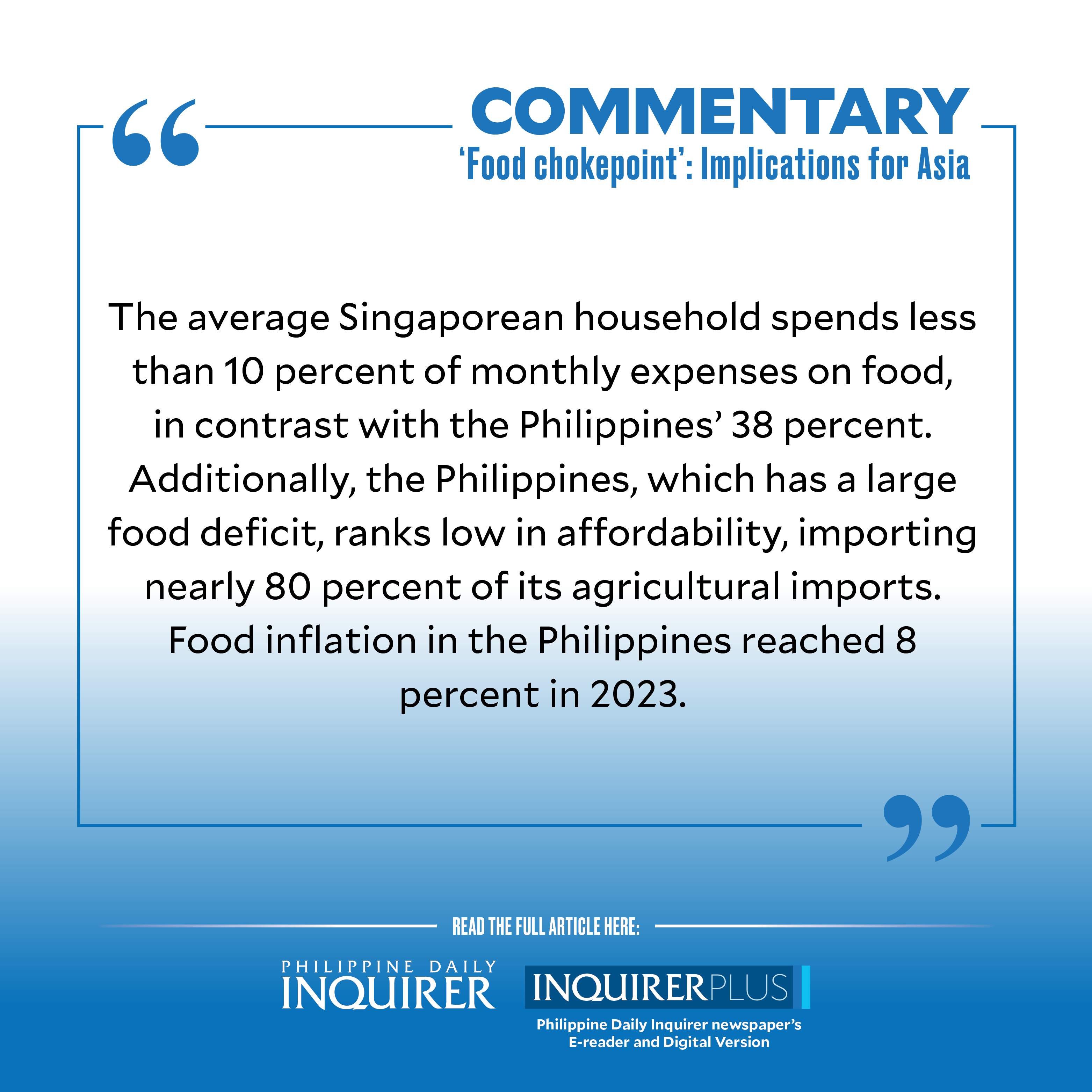‘Food chokepoint’: Implications for Asia

Singapore—In recent years, global food security has suffered from overlapping crises caused by conflicts, geopolitical tensions, climate change, and the COVID-19 pandemic, resulting in severe food supply disruptions.
These disruptions have been accentuated by several “food chokepoints” such as in the Red Sea where Yemen-based Houthi fighters have attacked merchant ships and caused uncertainty in food shipments via the Suez Canal. The shipping traffic through the Panama Canal has decreased due to drought which also hit river transportation systems such as the Mississippi River and the Rhine River.
As the global food system is already increasingly dependent on the movement of food from a few major “breadbasket” exporting regions to food-deficit areas around the world—often through these “food chokepoints”—the reliance on specific shipping routes intensifies the pressure on global food security. It also impacts agricultural product competitiveness, delivery schedules, as well as food availability and prices.
For both food-exporting and -importing countries, challenges loom. Exporting countries may face profit margin pressures, which reduce the prices for producers while importing countries grapple with potential increases in transportation costs, which lead to higher food prices, greater price volatility, and altered consumption patterns.
Southeast Asia, East Asia, and South Asia face heightened vulnerability due to their reliance on European and Black Sea markets for key agricultural products and fertilizers.
The most impacted—the lower-income and middle-income households—may also face heightened malnutrition risks, threatening to reverse decades of development progress in Asia.
The United States announced plans in late December 2023 for a task force to counter the Houthi attacks in the Red Sea but immediate relief for trade disruptions and food price inflation is unlikely. Continued supply chain disruptions coupled with escalating geopolitical tensions, raise concerns about food and fertilizer supplies being weaponized, as exemplified in the Ukraine-Russia war.
Amid recurrent crises, urgent reforms to food systems are essential. Governments and policymakers must prioritize preparedness and resilience-building at national and regional levels to address food security issues and mitigate future impacts.
For the many net food importing countries in Asia, aside from increasing national stockpiles, governments and policymakers should diversify sources to mitigate supply chain disruptions. A good example is Singapore, which, while importing over 90 percent of its food, has reduced vulnerability to food price and supply fluctuations through contact with more than 180 countries and regions. This strategy has been largely successful, resulting in Singapore enjoying the world’s second most affordable food, behind Australia. The average Singaporean household spends less than 10 percent of monthly expenses on food, in contrast with the Philippines’ 38 percent. Additionally, the Philippines, which has a large food deficit, ranks low in affordability, importing nearly 80 percent of its agricultural imports. Food inflation in the Philippines reached 8 percent in 2023.
With average households spending over a third of their income on food in countries like the Philippines, and lower-income households in countries like Indonesia spending up to 64 percent on food monthly, addressing food price inflation is crucial to safeguard average and lower-income households from undernutrition.
To address the interconnected issues of food availability, access, and affordability, Asian governments reliant on food imports could sign agreements with agricultural exporting countries in the region such as grain and oilseed powerhouses Australia and New Zealand. Doing so can avoid risks posed by chokepoints.
Greater focus on intraregional trading could also be encouraged, such as in Southeast Asia, which has large exporters of key agricultural products including rice (Vietnam and Thailand) and palm oil (Malaysia and Indonesia). Increased intraregional trade could reduce regional food import dependency while also increasing regional food accessibility, market stability, and economic development.
For Asian governments and policymakers, the ongoing supply chain disruptions in the Middle East are a reminder of the importance of resilient national and regional food supplies and agrifood systems. By implementing policy measures such as food import diversification and strengthening social safety nets, the region has a better chance of bracing itself for the food security challenges ahead. Asia News Network
—————-
Genevieve Donnellon-May is research associate at the Asia Society Policy Institute, Melbourne, Australia. Paul Teng is Adjunct Senior Fellow at the Centre for Non-Traditional Security Studies, S. Rajaratnam School of International Studies (RSIS), Nanyang Technological University, Singapore. This commentary first appeared on the RSIS’ website and was contributed to Asia News Network.
—————-
The Philippine Daily Inquirer is a member of the Asia News Network, an alliance of 22 media titles in the region.















